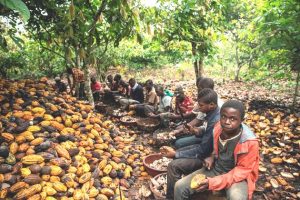Our contemplative practice with chocolate in Lecture 7 left me with a bitter taste in my mouth. This may be because we were ingesting raw cocoa nibs, but it was mostly due to the new information I received from this lecture that was difficult to digest. Prior to this contemplative practice, I loved eating, or baking/cooking with chocolate. I’ve always been skeptical of the international food trade run by Western food corporations, but after knowing the details of chocolate’s origins, it is even more disturbing than I could ever imagine.
In the BBC video “Cocoa farms in Ivory Coast still using child labour”, Humphrey Hawksley interviewed a boy who was working with a cocoa farmer in the Ivory Coast- he stated, “My father sent me here to work. I haven’t seen my family for 3 years” (BBC, 2011). Kwadyo Kwako (?) lived 200 miles away from his home, and it was disheartening to see the numb expression on his face as he spoke.
In a 2016 article by Fortune magazine called, “Inside Big Chocolate’s Child Labor Problem”, they reported: “More than 70% of the world’s cocoa is grown in the region, and the vast majority of that supply comes from two countries: Ivory Coast and Ghana, which together produce 60% of the global total” (Fortune, 2016). This goes to show how multinational chocolate producers are heavily dependent on West Africa – and its child laborers. Yet, despite their interdependence, the children working in these cocoa farms are still left with scars from their machetes, and no pay. BBC reported that multinational chocolate producers such as Nestle, Mars, etc. have made a promise to tackle on the issue of child labor in West Africa. This promise was made 17 years ago, and based on Fortune’s most recent article – it is still an ongoing problem.
These contemplative practices have helped me understand the significance of understanding the underlying issues that are embodied within one simple product. This particular contemplative practice with cocoa nibs was especially personal for me, as I was experiencing the form of the cocoa that these children only ever get to have: bitter, unappetizing, and dark.
In a nation where we are constantly distracted with materialistic desires, and consumed with busy schedules, we often don’t ever take the time to slow down, and think about in-depth issues that really matter. I eat 3 times a day, and yet rarely ever take the time to ask myself where the food comes from. After being introduced to these contemplative practices in class, I am more inclined to do these practices on my own – for the sake of inspiring myself to resolve the underlying issues possessed by the food I eat, and for the sake of these children and other victims of the food industry. I hope to see these practices inspiring more people, in order to foster awareness and empathy around issues that are within or even beyond the food industry.

Works Cited
Hawksley, Humphrey. “Cocoa Farms in Ivory Coast Still Using Child Labour.” BBC News, BBC, 10 Nov. 2011, www.bbc.com/news/av/world-africa-15686731/cocoa-farms-in-ivory-coast-still-using-child-labour.
O’Keefe, Brian. “Inside Big Chocolate’s Child Labor Problem.” Fortune, Fortune, 1 Mar. 2016, fortune.com/big-chocolate-child-labor/.
